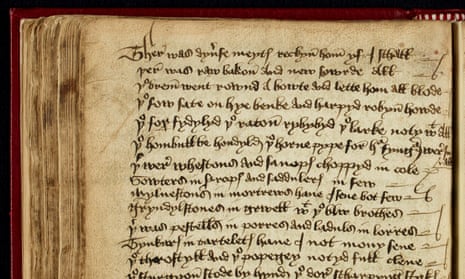 ‘Manuscripts often preserve relics of high art. This is something else’ … the Heege Manuscript. Photograph: National Library of Scotland
‘Manuscripts often preserve relics of high art. This is something else’ … the Heege Manuscript. Photograph: National Library of ScotlandThe Heege Manuscript which ‘pokes fun at everyone, high and low’ is among the earliest evidence of the life and work of a real minstrel
Sarah Shaffi
THE GUARDIAN
Wed 31 May 2023
From mocking kings and priests to encouraging audiences to get drunk, newly discovered texts at the National Library of Scotland have shed light on the role played by minstrels in medieval society.
Containing the earliest recorded use of the term “red herring” in English, the texts are part of a booklet known as the Heege Manuscript. Dr James Wade of the University of Cambridge, who discovered them, said echoes of minstrel humour can be found “in shows such as Mock the Week, situational comedies and slapstick”.
“The self-irony and making audiences the butt of the joke are still very characteristic of British standup comedy,” he added.
Throughout the middle ages, minstrels travelled between fairs, taverns and baronial halls to entertain people with songs and stories. Although fictional minstrels are common in medieval literature, references to real-life performers are rare, and the Heege Manuscript is among the first evidence of the life and work of a real minstrel.

Dr James Wade: ‘To get an insight into someone like that from this period is incredibly rare and exciting.’ Photograph: University of Cambridge
Wade, from Cambridge’s English faculty and Girton College, said that most “medieval poetry, song and storytelling has been lost”.
“Manuscripts often preserve relics of high art,” he continued. “This is something else. It’s mad and offensive, but just as valuable. Standup comedy has always involved taking risks and these texts are risky! They poke fun at everyone, high and low.”
The texts consist of a tail-rhyme burlesque romance entitled The Hunting of the Hare, a mock sermon in prose and an alliterative nonsense verse The Battle of Brackonwet. They were copied circa 1480 by Richard Heege, a household cleric and tutor to a Derbyshire family called the Sherbrookes, from a now lost memory-aid written by an unknown minstrel performing near the Derbyshire-Nottinghamshire border.
Wade believes the minstrel wrote part of his act down because its many nonsense sequences would have been extremely difficult to recall. “He didn’t give himself the kind of repetition or story trajectory which would have made things simpler to remember,” Wade said. “Here we have a self-made entertainer with very little education creating really original, ironic material. To get an insight into someone like that from this period is incredibly rare and exciting.”
The Hunting of the Hare is a poem about peasants, “full of jokes and absurd hijinks”. Wade said that one scene is reminiscent of Monty Python’s “Killer Rabbit of Caerbannog” sketch.
The sermon addresses the audience as “cursed creatures” and includes fragments from drinking songs. “This is a minstrel telling his audience, perhaps people of very different social standing, to get drunk and be merry with each other,” Wade said. The sermon also contains the first recorded use of the term “red herring”, when three kings eat so much that 24 oxen burst out of their bellies, sword fighting; the oxen chop each other up until they are reduced to three “red herrings”.
The Battle of Brackonwet features Robin Hood as well as jousting bears, battling bumblebees and partying pigs. The poem names several villages close to the Derbyshire-Nottinghamshire border and includes a “skilful demonstration of alliterative verse and a clever double entendre”.
Wade said: “We shouldn’t assume that popular entertainers weren’t capable of poetic achievement. This minstrel clearly was.”
Wade’s study is published on Wednesday in The Review of English Studies journal.
Wade, from Cambridge’s English faculty and Girton College, said that most “medieval poetry, song and storytelling has been lost”.
“Manuscripts often preserve relics of high art,” he continued. “This is something else. It’s mad and offensive, but just as valuable. Standup comedy has always involved taking risks and these texts are risky! They poke fun at everyone, high and low.”
The texts consist of a tail-rhyme burlesque romance entitled The Hunting of the Hare, a mock sermon in prose and an alliterative nonsense verse The Battle of Brackonwet. They were copied circa 1480 by Richard Heege, a household cleric and tutor to a Derbyshire family called the Sherbrookes, from a now lost memory-aid written by an unknown minstrel performing near the Derbyshire-Nottinghamshire border.
Wade believes the minstrel wrote part of his act down because its many nonsense sequences would have been extremely difficult to recall. “He didn’t give himself the kind of repetition or story trajectory which would have made things simpler to remember,” Wade said. “Here we have a self-made entertainer with very little education creating really original, ironic material. To get an insight into someone like that from this period is incredibly rare and exciting.”
The Hunting of the Hare is a poem about peasants, “full of jokes and absurd hijinks”. Wade said that one scene is reminiscent of Monty Python’s “Killer Rabbit of Caerbannog” sketch.
The sermon addresses the audience as “cursed creatures” and includes fragments from drinking songs. “This is a minstrel telling his audience, perhaps people of very different social standing, to get drunk and be merry with each other,” Wade said. The sermon also contains the first recorded use of the term “red herring”, when three kings eat so much that 24 oxen burst out of their bellies, sword fighting; the oxen chop each other up until they are reduced to three “red herrings”.
The Battle of Brackonwet features Robin Hood as well as jousting bears, battling bumblebees and partying pigs. The poem names several villages close to the Derbyshire-Nottinghamshire border and includes a “skilful demonstration of alliterative verse and a clever double entendre”.
Wade said: “We shouldn’t assume that popular entertainers weren’t capable of poetic achievement. This minstrel clearly was.”
Wade’s study is published on Wednesday in The Review of English Studies journal.
No comments:
Post a Comment